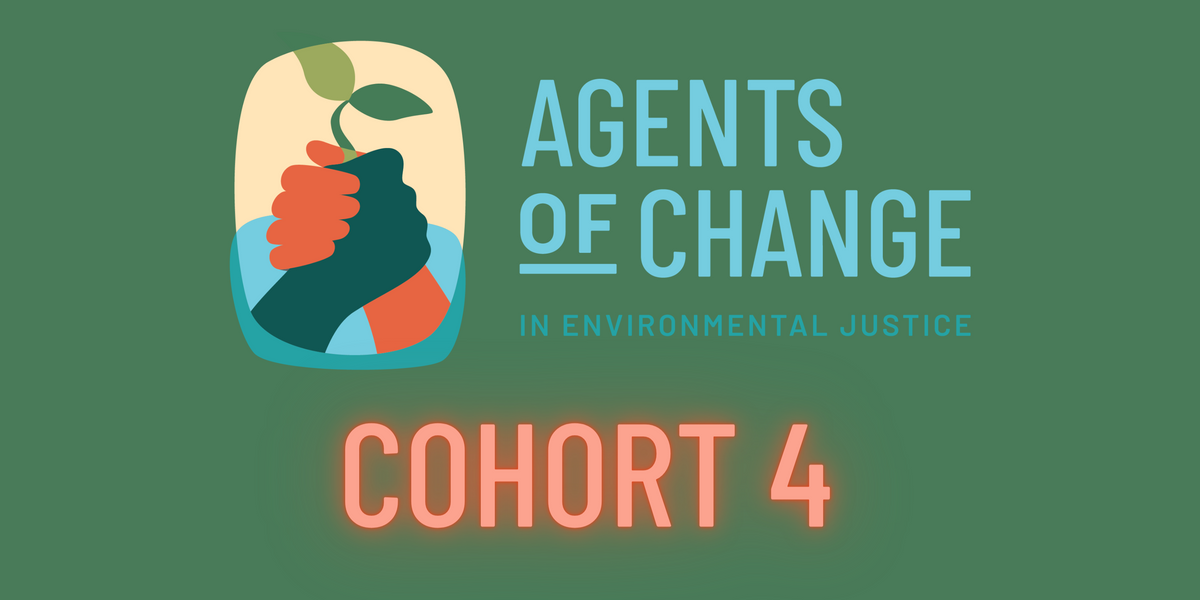
21 February
Agents of Change: 2022-2023 Cohort
Read the ideas and solutions from our fourth cohort.
2022-2023 Cohort
Public lands are not neutral. We must grapple with their racist roots
 Credit: Carolyn E. Ramírez
Credit: Carolyn E. Ramírez
Read the ideas and solutions from our fourth cohort.
 Credit: Carolyn E. Ramírez
Credit: Carolyn E. Ramírez
Caught in a deadly heatwave, David Azevedo's effort to impress in a new job tragically cost him his life, underscoring the urgent need for better protections for outdoor workers.
In short:
Key quote:
“Workers are compelled to be in the heat. They have to work or they lose their livelihood. This speaks to a wider dynamic: power and money determine your vulnerability to climate change.”
— Cora Roelofs, professor at the University of Massachusetts Lowell
Why this matters:
As heatwaves become more frequent and severe, our bodies are pushed to their limits, and the risks aren't just limited to those working under the sun. Read more: How youth can battle extreme heat in their communities.

CAMERON PARISH, La. — Late into the night, John Allaire watches the facility next to his home shoot 300-foot flares from stacks.
He lives within eyesight of southwest Louisiana’s salty shores, where, for decades, he’s witnessed nearly 200 feet of land between it and his property line disappear into the sea. Two-thirds of the land was rebuilt to aid the oil and gas industry’s LNG expansion. LNG — shorthand for liquified natural gas – is natural gas that's cooled to liquid form for easier storage or transport; it equates to 1/600th the volume of natural gas in a gaseous state. It’s used to generate electricity, or fuel stove tops and home heaters, and in industrial processes like manufacturing fertilizer.
In the U.S., at least 30 new LNG terminal facilities have been constructed or proposed since 2016, according to the Oil and Gas Watch project. Louisiana and Texas’ Gulf Coast, where five facilities are already operating, will host roughly two-thirds of the new LNG terminals – meaning at least 22 Gulf Coast LNG facilities are currently under construction, were recently approved to break ground or are under further regulatory review.
Although the U.S. didn’t ship LNG until 2016, when a freight tanker left, a few miles from where Cameron Parish’s LNG plants are today, last year the country became the global leader in LNG production and export volume, leapfrogging exporters like Qatar and Australia. The EIA’s most recent annual outlook estimated that between the current year and 2050, U.S. LNG exports will increase by 152%.
And it’s changed local economic estimates: last year, retired Louisiana State University professor Loren Scott’s economic forecast last year predicted an additional $36 billion in oil and gas industry spending will boost local employment by 7% over just two years.
Allaire, 68, watches how saltwater collects where rainwater once fed the area’s diminishing coastal wetlands. “We still come down here with the kids and set out the fishing rods. It's not as nice as it used to be,” he told Environmental Health News (EHN).
That intimacy with nature drew Allaire to the area when he purchased 311 acres in 1998. An environmental engineer and 30-year oil and gas industry veteran, he helped lead environmental assessments and manage clean-ups, and although retired, he still works part-time as an environmental consultant with major petroleum companies. With a lifetime of oil and gas industry expertise, he’s watched the industry's footprint spread across Louisiana and the Gulf of Mexico’s fragile shores and beyond. Now that the footprints are at the edge of his backyard, Allaire is among a cohort of organizers, residents and fisher-folk in the region mobilizing to stop LNG facility construction. For him, the industry’s expansion usurps the right-or-wrong ethics he carried across his consulting career. For anglers, oil and gas infrastructure has destroyed fishing grounds and prevented smaller vessels from accessing the seafood-rich waters of the Calcasieu River.
From the view of Allaire’s white pickup truck as he drives across his property to the ocean’s shore, he points to where a new LNG facility will replace marshlands. Commonwealth LNG intends to clear the land of trees and then backfill the remaining low-lying field.
“You see what’s happening with the environment,” Allaire said. “When the facts change, I got to change my mind about what we’re doing.”

John Allaire, left, purchased 311 acres in Cameron Parish in 1998, and has watched the oil and gas industry's footprint spread to his property.
Credit: John Allaire
During an Earth Day rally in April, community members gathered in the urban center of Lake Charles to demand local oil and gas industries help deliver a safer, healthier future for all. In between live acts by artists performing south Louisiana’s quintessential zydeco musical style, speakers like James Hiatt, a Calcasieu Parish native with ties to Cameron Parish and a Healthy Gulf organizer, and RISE St. James organizer Sharon Lavigne, who’s fighting against LNG development in rural Plaquemines Parish near the city of New Orleans, asked the nearly 100 in attendance to imagine a day in which the skyline isn’t dotted by oil and gas infrastructure.
Not long ago, it was hard to imagine an Earth Day rally in southwest Louisiana at all. For decades, the area has been decorated with fossil fuel infrastructure. Sunsets on some days are highlighted by the chemicals in the air; at night, thousands of facilities’ lights dot the dark sky.
“It takes a lot of balls for people to start speaking up,” Shreyas Vasudevan, a campaign researcher with the Louisiana Bucket Brigade, told EHN in the days after the rally. In a region with its history and economy intertwined with oil and gas production, “you can get a lot of social criticism – or ostracization, as well – even threats to your life.”
Many are involved in local, regional and national advocacy groups, including the Louisiana Bucket Brigade, Healthy Gulf, the Sierra Club, the Natural Resources Defense Council, the Turtle Island Restoration Network, the Center for Biological Diversity and the National Audubon Society.
But environmental organizers are fighting a multi-billion-dollar industry with federal and state winds at its back. And LNG’s federal support is coupled with existing state initiatives.
Under outgoing Louisiana Gov. John Bel Edwards — a term-limited Democrat — the state pledged a goal of reaching net-zero greenhouse emissions by 2050. Natural gas, which the LNG industry markets as a cleaner-burning alternative, is cited as one of the state’s solutions. Louisiana is the only state that produces a majority of its carbon emissions through fossil fuels refining industries, like LNG, rather than energy production or transportation. Governor Edwards’ office did not return EHN’s request for comment.
This accommodating attitude towards oil and gas industries has resulted in a workforce that’s trained to work in LNG refining facilities across much of the rural Gulf region, said Steven Miles, a lawyer at Baker Botts LLP and a fellow at the Baker Institute’s Center on Energy Studies. Simultaneously, anti-industrialization pushback is lacking. It’s good news for industries like LNG.
“The bad news,” Miles added. “[LNG facilities] are all being jammed in the same areas.”
One rallying cry for opponents is local health. The Environmental Integrity Project found that LNG export terminals emit chemicals like carbon monoxide –potentially deadly– and sulfur dioxide, of which the American Lung Association says long-term exposure can lead to heart disease, cancer, and damage to internal or female reproductive organs.
An analysis of emissions monitoring reports by the advocacy group the Louisiana Bucket Brigade found that Venture Global’s existing Calcasieu Pass facility had more than 2,000 permit violations.That includes exceeding the permit’s authorized air emissions limit to release nitrogen oxides, carbon monoxide, particulate matter and volatile organic compounds 286 out of its first 343 days of operation.

The Marvel Crane, the first liquid natural gas carrier to transport natural gas from the Southwest Louisiana LNG facility, transits a channel in Hackberry, Louisiana, May 28, 2019.
Credit: Coast Guard News
Rather than amend its infrastructure to meet regulatory standards, Venture Global is asking the state to raise its facility’s air emissions permit limits to release an additional 833% of greenhouses gasses each year, according to the Louisiana Bucket Brigade’s January report. If approved, permitted emissions would rise to roughly 4.65 million tons, making the facility the state’s fifth-largest emitter), according to a 2021 statewide greenhouse data inventory compiled by Louisiana State University’s Center for Energy Studies.
“This is just one facility,” at a time when three more facilities have been proposed in the region and state, Vasudevan said. Venture Global’s operational LNG facility — also known as Calcasieu Pass — “is much smaller than the other facility they’ve proposed.”
In an area that experienced 18 feet of storm surge during Hurricane Laura in 2020 — and just weeks later, struck by Hurricane Delta — Venture Global is planning to build a second export terminal Known as “CP2,” it’s the largest of the roughly two dozen proposed Gulf LNG export terminals, and a key focal point for the region’s local organizing effort.
Residents “don’t really want LNG as much as they want Cameron [Parish] from 1990 back,” Hiatt told EHN of locals’ nostalgia for a community before storms like Rita in 2005 brought up to 15 feet of storm surge, only for Laura to repeat the damage in 2020. Throughout that time, the parish’s population dipped from roughly 10,000 to 5,000. “But the wolf knocking at the door is LNG. Folks in Cameron think that's going to bring back community, bring back the schools, bring back this time before we had all these storms — when Cameron was pretty prosperous.”
“Clearly,” for the oil and gas industry, “the idea is to transform what was once the center of commercial fishing in Louisiana to gas exports,” Cindy Robertson, an environmental activist in southwest Louisiana, told EHN.
Helping fishers’ impacted by LNG is about “actual survival of this unique culture,” Cooke said.
In a measure of organizers’ success, she pointed to a recent permit hearing for Venture Global’s CP2 proposal. Regionally, it’s the only project that’s received an environmental permit, but not its export permit, which remains under federal review. At the meeting, some spoke on the company’s behalf. As an organizer, it was a moment of clarity, Cooke explained. Venture Global officials “had obviously done a lot of coaching and organizing and getting people together in Cameron to speak out on their behalf,” Cooke said. “So, in a way, that was bad. But in another way, it shows that we really had an impact.”
“It also shows that we have a lot to do,” Cooke added.
Environmental organizers like Alyssa Portaro describe a sense of fortitude among activists — she and her husband to the region’s nearby town of Vinton near the Texas-Louisiana border. Since the families’ relocation to their farm, Portaro has worked with Cameron Parish fisher-folk.
“I’ve not witnessed ‘community’ anywhere like there is in Louisiana,” Portaro told EHN. But a New Jersey native, she understands the toll environmental pollution has on low-income communities. “This environment, it’s so at risk — and it’s currently getting sacrificed to big industries.”
“People don’t know what we’d do without oil and gas. It comes at a big price,” she added.

Southwest Louisiana’s Cameron Parish is one of the state’s most rural localities. Marine economies were the area’s economic drivers until natural disasters and LNG facilities began pushing locals out, commercial fishers claim.
Credit: Xander Peters for Environmental Health News

Residents “don’t really want LNG as much as they want Cameron [Parish] from 1990 back,” James Hiatt , a Healthy Gulf organizer, told EHN. "But the wolf knocking at the door is LNG."
Credit: Xander Peters for Environmental Health News

For the most part, Cameron Parish’s life and economy has historically taken place at sea. As new LNG facilities are operational or in planning locally, locals claim the community they once knew is nearly unrecognizable.
Credit: Xander Peters for Environmental Health News
The stakes are seemingly higher for a region like southwest Louisiana, which is the epicenter of climate change impacts.
In nearly a century, the state has lost roughly 2,000 square miles of land to coastal erosion. In part driving the state’s erosion crisis is the compounding impacts of Mississippi River infrastructure and oil and gas industry activity, such as dredging canals for shipping purposes, according to a March study published in the journal Nature Sustainability. Louisiana’s Coastal Protection and Restoration Authority said Cameron Parish could lose more land than other coastal parishes over the next 50 years. A recent Climate Central report says the parish will be underwater within that time frame.
On top of erosion and sea level rise impacts, in August, 2023, marshland across southwest Louisiana’s Cameron Parish burned. The fires were among at least 600 across the Bayou State this year. Statewide, roughly 60,000 acres burned — a more than six-fold increase of the state’s average acres burned per year in the past decade alone.
But while the blaze avoided coastal Louisiana communities like Cameron Parish, the fires represented a warning coming from a growing chorus of locals across the region — one that’s echoes by the local commercial fishing population, who claimed to have experienced unusually low yields during the same time, according to a statement from a local environmental group. At the site of the Cameron Parish fires are locations for two proposed LNG expansion projects.
It was an unusual occurrence for an area that’s more often itself underwater this time of year due to a storm surge from powerful storms. For LNG expansion’s local opposition, it was a red flag.
As the Louisiana Bucket Brigade has noted prior, the confluence of climate change’s raising of sea levels and the construction of LNG export terminals — some are proposed at the size of nearly 700 football fields — are wiping away the marshland folks like Allaire watched wither. Among their fears is that the future facilities won’t be able to withstand the power of another storm like Laura and its storm surge, which wiped away entire communities in 2020.
Amidst these regional climate impacts, LNG infrastructure has shown potential to exacerbate the accumulation of greenhouse gasses that cause global warming. For the most part, LNG is made up of methane — a greenhouse gas that’s more than 80 times more potent than carbon dioxide in the atmosphere. Among the 22 current LNG facility proposals, the advocacy group Sierra Club described a combined climate pollution output that would roughly equal to that of about 440 coal plants.
The climate impacts prompt some of the LNG industry’s uncertainty going forward. It isn’t clear if Asian countries, key importers of U.S. LNG, will “embrace these energy transition issues,” said David Dismuke, an energy consultant and the former executive director of Louisiana State University’s Center for Energy Studies. Likewise, European nations remain skeptical of embracing LNG as a future staple fuel source.
“They really don't want to have to pull the trigger,” Dismukes added, referring to Europe’s hesitation to commit more resources to exporting LNG from the American market. “They don't want to go down that road.”
While there will be a tapering down of natural gas supply, Miles explained, “we’re going to need natural gas for a long time,” as larger battery storage for renewables is still unavailable.
“I'm not one of these futurists that can tell you where we're going to be, but I just don't see everything being extreme,” Dismukes said. “I don't see what we've already built getting stranded and going away, either.”
For now, LNG seems here to stay. From 2012 to 2022,U.S. natural gas demand — the sum of both domestic consumption and gross exports — rose by a whopping 43%, reported the U.S. Energy Information Administration, or EIA. Meanwhile, in oil and gas hotbeds like Louisiana and Texas, natural gas demand grew by 116%.
Throughout 25 years, Allaire has witnessed southwest Louisiana’s land slowly fade, in part driven by the same industrial spread regionally. Near where the front door of his travel trailer sits underneath the aluminum awning, he points to a chenier ridge located near the end of the property. It’s disappearing, he said.
“See the sand washing over, in here?” Allaire says, as he points towards the stretches of his property. “This pond used to go down for a half mile. This is all that's left of it on this side.”
Read Part 1: LNG production comes with a price, Gulf Coast communities warn
Some funding for this reporting was also provided by the Wake Forest University Environmental and Epistemic Justice Initiative.

As climate change intensifies, scientists are exploring geo-engineering as a potential solution, but the approach raises both hope and serious concerns.
In short:
Key quote:
“The regional impacts are very much unknown. We may be able to mitigate global average temperature [rise], but we may actually make things worse in certain regions of the world."
— Professor Liz Bentley, chief executive of the Royal Meteorological Society
Why this matters:
Whether geo-engineering is our ticket to a cooler planet or Pandora’s box, it’s a conversation that’s heating up fast. Is it better to take a risky shot at cooling the planet or stick to traditional methods like cutting emissions and hoping for the best? Read more: Opponents of geoengineering misunderstand humanity’s choices.

Officials in Chapel Hill, NC, face criticism over a plan to redevelop a coal ash site near a popular greenway, as community members fear health risks from lingering toxic metals.
In short:
Key quote:
"Simply burying the ash under a layer of soil will do nothing to clean up the contamination and address these environmental and public health hazards."
— Perrin de Jong, Southeast staff attorney with the Center for Biological Diversity
Why this matters:
Coal ash, a byproduct of burning coal for electricity, contains harmful substances such as arsenic, lead, and mercury. These toxins have been linked to a variety of health issues, including cancer and neurological damage. As the town officials push forward with redevelopment plans, community members are rallying to ensure that proper safety measures are taken to mitigate any exposure to these dangerous contaminants.

Vice President Harris, known for her strong environmental stance, might carry forward Biden’s climate policies with significant implications for the U.S.'s climate future.
Joshua Partlow and Brady Dennis report for The Washington Post.
In short:
Key quote:
“I think these issues really are core to who she is, and she cares deeply. I think she would be rock solid and determined to carry on and build on the progress of this administration.”
— Tiernan Sittenfeld, senior vice president for government affairs at the League of Conservation Voters.
Why this matters:
With a track record of supporting green initiatives and a commitment to environmental justice, Kamala Harris's potential presidency could mean ramped-up efforts to curb emissions, invest in renewable energy, and hold polluters accountable. Read more: Speaker Mike Johnson’s climate change playbook — deny the science, take the funding.

As the U.S. boosts fossil fuel deals under Trump and Biden, Europe's shift to renewables risks reducing demand for American gas.
In short:
Key quote:
"We expect that demand for natural gas is going to continue declining at pace. Given we have these climate commitments, the expectation is that demand will be lower by 2030, even lower by 2040, with the effect that there is no long-term gas demand in Europe."
— Georg Zachmann, senior fellow at economics think tank Bruegel
Why this matters:
The clash between U.S. fossil fuel ambitions and Europe's renewable energy goals could lead to oversupply and economic repercussions. As Europe reduces gas dependency, American companies will need to adapt to changing global energy demands.

Federal funding for lithium mining under the Inflation Reduction Act is raising concerns about environmental impacts on water supplies.
In short:
Key quote:
"We need lithium as a part of our transition off of fossil fuels, but it can’t come at the expense of biodiversity or our most precious protected areas."
— Patrick Donnelly, Center for Biological Diversity
Why this matters:
Increased lithium mining is critical for the energy transition, but it threatens water resources and ecosystems, especially in arid regions. Effective regulations and alternative battery technologies are needed to balance environmental concerns with energy needs.
Power shutoffs or wildfire evacuations can be deadly for disabled people, especially nondrivers who may not have a way to get to a cooling center or evacuation point.
“Because of its purchasing power … the Federal Government has the potential to significantly impact the supply of these products.”
The bill was opposed by 45 environmental groups.
“It wouldn’t even make a dent in the amount of plastic pollution out there.”
“Putting resources toward carbon capture and storage instead of renewable energy is wasting time we don’t have.”
Farmers of color who are leading the charge for regenerative farming, as they have done for generations, need our support now more than ever.